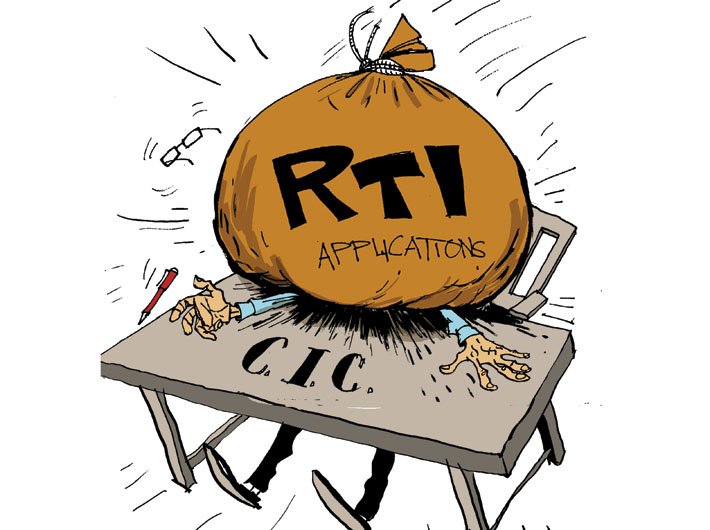For nearly 2 lakh pending RTI cases and complaints, penalty imposed for delay in providing information in only 214 cases. That’s less than 0.5%, says RTI study on Act’s 9th anniversary
The headless and non-functional information commissions and huge pendency of appeals and complaints at the Centre and in many states are some of the obstacles the Right to Information (RTI) Act is currently battling with.
Just days before the RTI Act enters its tenth year, a study by RTI Assessment and Advocacy Group (RaaG) and Samya-Centre for Equity Studies, in collaboration with NCPRI, highlights an alarming picture of the state of information commissions across the country, which are facing the weight of huge number of pending cases.
For instance, it shows that if one is to file an RTI appeal with the state information commission of Madhya Pradesh today, given the current backlog and the rate of clearance in the state, it will only come up for hearing in about 60 years. West Bengal state commission, meanwhile, will take about 18 years, whereas at CIC it would take almost a year to hear a complaint.
The central chief information commissioner, which looks after cases related to the prime minister, parliament, president, supreme court and all high courts, election commission, among many others, retired in August this year. The position is lying vacant since then, resulting in further backlog of appeals and complaints at the CIC. There are huge and growing delays in the disposal of cases in many of the state information commissions (SICs) as well.
In Assam and Manipur, there are no information commissioners and so the commission is non-functional since March 2013 and March 2014, respectively. In Rajasthan and Madhya Pradesh, the commission were non functional for over a year till last year building up huge pendency.
Addressing a press conference in New Delhi while releasing the study on Friday, Shekhar Singh, a member of the National Campaign for People’s Right to Information (NCPRI), said that the major worry is that the RTI Act is being squeezed. “Efforts have been made thrice to amend the Act. These are ways to strangle the Act. Similar such things are happening in many developed countries as well,” he said.
The RTI became a law on October 13, 2005, giving every Indian the right to seek information from any public authority. In the process, it promotes transparency and accountability in the functioning of India’s democracy.
Govt not proactive
Anjali Bhardwaj, an RTI activist and member of NCPRI said the headless commissions at the Centre and across the country is a matter of great concern as it weakens the system. “The chief information commissioner is responsible for overall management of the commission, and the vacancy is causing further backlog.”
She said one of the reasons for the delay in appointment of chief information commissioner at CIC is that there is no recognised leader of opposition (LoP), who is an essential member of the selection committee. The selection committee consists of prime minister, leader of opposition and a union cabinet minister. But in case the LoP is not recognized, the law allows authorising the leader of the single largest opposition party in parliament, she said.
“We have written to the PM, the DoPT and the president but there has not been any response yet,” Bhardwaj said. “RTI has been an important tool for people to fight corruption.”
Also, the group demanded that the whistleblower’s protection law passed by parliament in February 2014 needs to be urgently operationalised by framing appropriate rules.
Nikhil Dey, RTI activist and another member of NCPRI, said, “While the previous government promised a lot, it hardly did anything. The new government has not done anything as far as ensuring transparency and accountability is concerned in its first 100 days.”
He said the new government could have easily started work on grievance redress law and appointments for the lokpal.
Proactive disclosure
From the assessment of nearly a thousand RTI applications, nearly 70 percent of the applications seek information that should have been proactively made public without citizens having to file an application. And 49 percent of the application sought information which should have been disclosed under section 4 of the RTI Act or other similar sections in other laws.
The data also highlighted that SICs are imposing penalties in less than 4% of the cases, in which they are imposable.
While the total number of pendency of RTI cases is about 2 lakh appeals and complaint, only in less than 0.5% (214) cases has penalty been imposed for delay in providing information. The highest has been in Maharashtra, Karnataka and Andhra Pradesh.
The claim made by the former prime minister Manmohan Singh that the RTI Act was misused and information required takes a long time span, the study highlighted that less than 1% of the application could be classified as vexatious or frivolous and a little over 1% seeks voluminous information.
For the study, 59 PIOs were interviewed, of which 38% said they spent less than 2 hours in a week in compiling information and 39% said they spent between 2-5 hours on this work.
Shekhar said the study also highlights that the RTI Act was largely used as a last resort to get the otherwise unresponsive government, to take action against on their complaints. He added that if information commissioners start imposing penalty there will be tremendous pressure on Public Information Officers (PIOs) and this would also bring down the number of appeals.
Also, none of the six national political parties have appointed PIOs as directed by the Central Information Commission in June last year.

